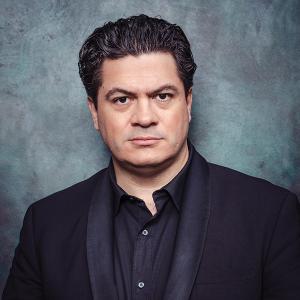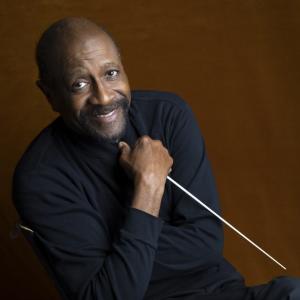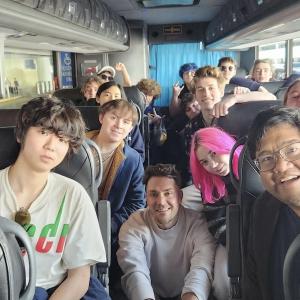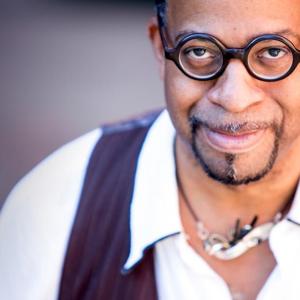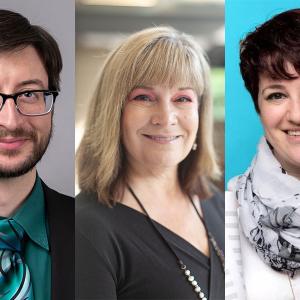Interlochen Online's next session begins May 6—enroll in any course or certificate program now.
Creating opportunities through collaboration
Interlochen Arts Camp alumnus Stanford Thompson unites musical organizations across the country to level the playing field for BIPOC musicians.
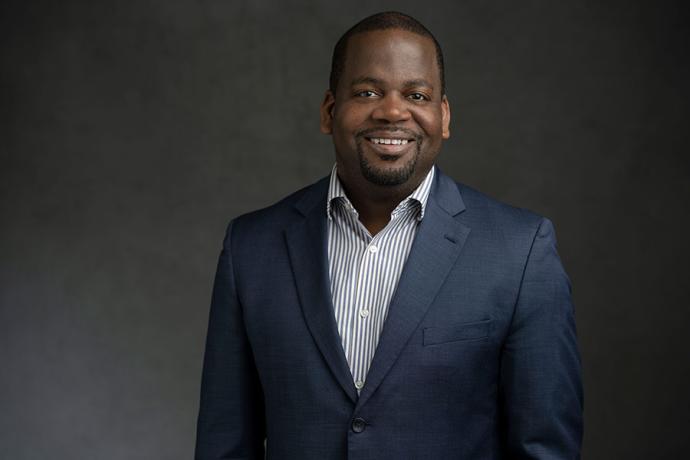
Stanford Thompson. Photo credit: Todd Rosenberg.
Stanford Thompson (IAC 00-03; IAC St 05-06, 08) has always been a man with vision.
As a high school student in Atlanta, Georgia, Thompson co-founded the Atlanta Trumpet Festival at Emory University. In 2011, Thompson co-founded Play On Philly, an El Sistema-inspired program that provides high quality music education to K-12 students in west Philadelphia—at no cost. Thompson also proposed the Sphinx LEAD program—for which he served as dean—shared his ideas with audiences around the world as a 2017 TED Fellow; and helped chart the future of Interlochen Center for the Arts as a member of the Board of Trustees (2013-17).
In 2018, Thompson conceived one of his most revolutionary ideas to date: A national coalition of music organizations working together to level the playing field for BIPOC musicians. Thompson’s vision came to fruition in January 2021 with the establishment of Equity Arc (formerly known as the National Instrumentalist Mentoring and Advancement Network), an association that unites organizations working in all stages of musical development to develop new pathways for classical musicians of color and increase access to resources and opportunities.
On May 1, 2023, Thompson stepped into a full-time position as the inaugural Executive Director of Equity Arc. In this role, Thompson will leverage a wealth of personal and professional experience to transform the classical music industry from the inside out.
“I’ve met a lot of kids from all over the country who really want to be professional classical musicians,” Thompson said. “It means a lot to me to help many more of them get the opportunities they deserve and that they need to take their next steps.”
From southern roots to northern pines
Music is in Thompson’s blood: His parents, both retired music educators, instilled a love of music—and a commitment to dedicated practice—upon their eight children.
“We always had a rule in our house that you only ate on the days that you practiced,” Thompson shared in a 2018 interview with PBS News Hour.
Thompson picked up the trumpet at age eight, going on to perform with the Atlanta Youth Wind Symphony and participate in the Atlanta Symphony Orchestra’s Talent Development Program. Thompson learned about Interlochen Arts Camp from his brother, bassist and Charlotte Symphony Youth Ensemble conductor Eric (IAC 99-02), who attended Camp for the first time in the summer of 1999.
“I remember him coming back and speaking about how magical this place was,” Thompson said.
Thompson joined Eric at Camp in the summer of 2000, beginning a decades-long affiliation with the organization.
“The coolest part for me was being in a cabin with 14 other students who were studying different art forms,” Thompson said. “It opened up my world to everything the arts have to provide. It also opened me up to new experiences. I remember being in a community that was very open, where folks were talking about things like their sexuality and their beliefs. It was a really safe place to be who you were. Growing up in a conservative community, Interlochen was a breath of fresh air.”
Thompson also thrived musically during his time at Camp. “The music program has always been strong at Interlochen,” he said. “There were really, really great musical opportunities: from hearing the Detroit Symphony Orchestra each year to the countless conductors that visited. I had the chance to hear Van Cliburn perform twice, and I worked with conductors like Jan Roller and Gerard Schwarz. It was a really big growing opportunity for me.”
Making an impact beyond the back row
After high school, Thompson continued his musical studies at the Curtis Institute of Music with the intention of pursuing a career as a professional trumpeter. During his final semester at the institute, his plans were altered by an event that stunned the classical music community: The appointment of Venezuelan conductor Gustavo Dudamel as the next Music Director of the Los Angeles Philharmonic.
“Dudamel was one of the first conductors of color in a major American orchestra, and that made some really big waves,” Thompson said.
Dudamel’s rise drew international attention to the musical organization that had nurtured his talents, El Sistema, earning founder Dr. José Antonio Abreu the 2009 TED Prize.
“All eyes were on this social development and music education program in Venezuela, because this conductor didn’t go through Curtis or Julliard or the Vienna Conservatory—he came out of this program,” Thompson said. “I immediately saw an opportunity, and I wanted to be a part of creating large-scale impact on communities. I felt I could do that better as an administrator than from the back row of an orchestra.”
Thompson enrolled in the New England Conservatory’s Sistema Fellows Program, a professional training program designed to prepare fellows to launch, manage, and lead El Sistema-inspired programs in the United States. Following his completion of the program, Thompson collaborated with philanthropist Carole Haas Gravagno to establish Play On Philly.
In the 12 years since its inception, Play On Philly has grown to encompass five locations, providing musical instruction to approximately 400 K-12 students annually.
“Jumping into the work of Play On Philly—working with those communities, families, and young people—was a really big treat,” Thompson said. “To take what I saw modeled at places like Interlochen and to create that type of environment for other young people was really cool.”
Connecting students to opportunities
Despite Play On Philly’s successes, Thompson soon began grappling with the challenges of supporting the program’s most gifted students.
“What working with Play On Philly showed me is that there are very, very talented young musicians who want to be part of professional stages later on,” Thompson said. “One of the limitations of Play On Philly is that since it is a socially focused program, we don’t necessarily have all of the resources to help these students pursue music as a professional career. We had to be very resourceful and work with places like Interlochen, local youth orchestras, and other national training programs to help our students matriculate to conservatories like the Royal College of Music in London, Eastman School of Music, and the Peabody Institute.”
As Thompson forged connections at other institutions, he considered the challenges he and his colleagues at Play On Philly had faced in helping their students achieve their musical goals.
“I said to myself, ‘Should it be so difficult for an executive director like me to connect our students to these advanced-level opportunities?’” he said. “‘Or can we create a much more streamlined and collaborative process to help musicians of color get support?’”
Those questions sparked the idea for Equity Arc. In 2018, Thompson introduced the idea to his connections at organizations across the country, refining the concept over a two-year period. In January 2021, Thompson convened musical leaders in Cincinnati, Ohio to formally discuss the creation of a national coalition of musical organizations committed to developing equitable opportunities for aspiring classical musicians of color. The two-day convening resulted in the establishment of Equity Arc and the installation of Thompson as the association’s board chairman.
Through participation in Equity Arc, partner organizations—including Interlochen Center for the Arts—are able to access information and resources to aid in increasing the diversity and equity of their programs.
“Most music organizations have articulated that they would like to increase diversity and inclusion within their organizations,” Thompson said. “Organizations that are doing so through the training of underrepresented musicians have agreed to share information with other Equity Arc members—both about the musicians they’re working with, as well as what they have learned from running their own initiatives. By sharing that information, we’re able to identify areas of collective action.”
One example of this sharing of information is the Common Application, which the Interlochen Center for the Arts admission team helped develop. Through the Common Application, musicians of color are able to submit a single application for consideration for multiple opportunities.
“We wanted to make it easier for musicians of color to apply to places like Interlochen,” Thompson said. “We agreed to create one set of repertoire and one application—which is free—so that we can connect potential students with admission representatives from many applicable programs across the United States.”
Beyond the Common Application, Thompson is challenging Equity Arc partners to reevaluate their own internal admission, enrollment, and operational processes.
“One of our biggest goals is to support organizations as they rethink and adjust their policies and practices,” Thompson said. “Many of these policies and practices favor students who already have access to resources, information, and opportunities that work really well. We are trying to encourage these organizations to think about how these systems and policies exclude underrepresented cultural groups.”
Thompson is also collaborating with Equity Arc’s staff and partners to develop new strategies for supporting underrepresented students.
“We’re working with a lot of our organizations to provide advancement opportunities for musicians of color within these institutions,” he said.
Ultimately, Thompson hopes to establish a foundation upon which future diversity, equity, and inclusion advocates can build.
“I look at this as generational work,” he said. “I think about the legacy that Interlochen has had, over many generations, on not only artists, but also the people who have worked there and have called Interlochen home. I want Equity Arc to have a similar impact on a group of musicians that have been underrepresented for a really long time.”
Thompson also acknowledges that there is still much work to be done, important progress is already being made.
“Interlochen has been doing the work that Equity Arc is doing for quite some time,” he said. “Through initiatives like the partnership with the Miami Music Project, Interlochen has been a champion for including those who have been left out. Interlochen is a great partner to Equity Arc. Interlochen’s administrators—as well as the organization’s alumni on both the professional stage and the college level—are really leading the way for their colleagues.”
